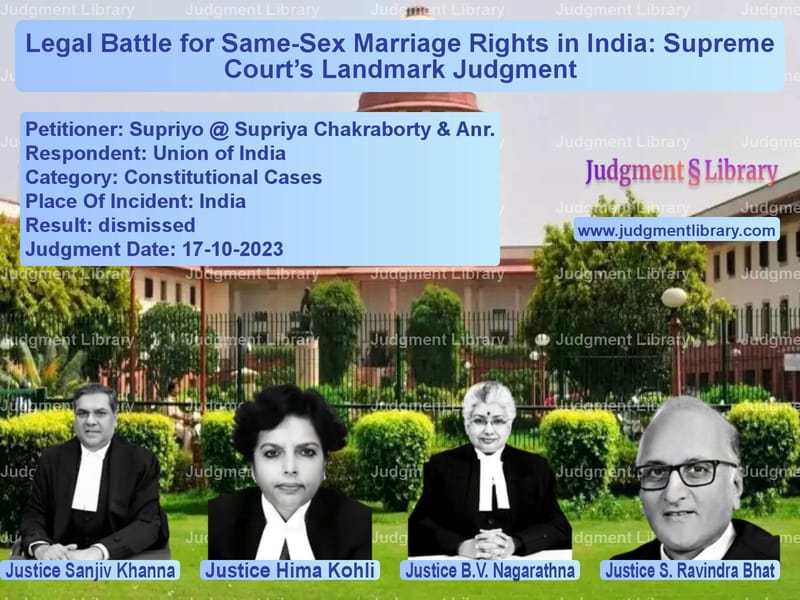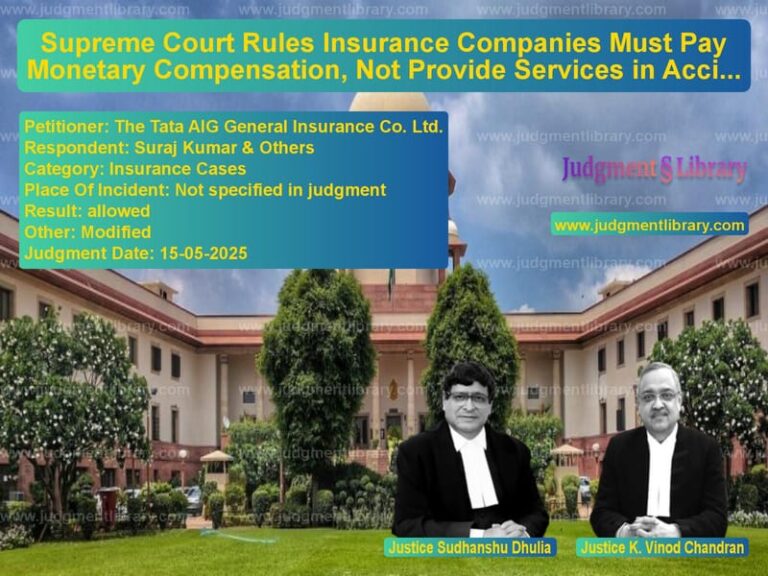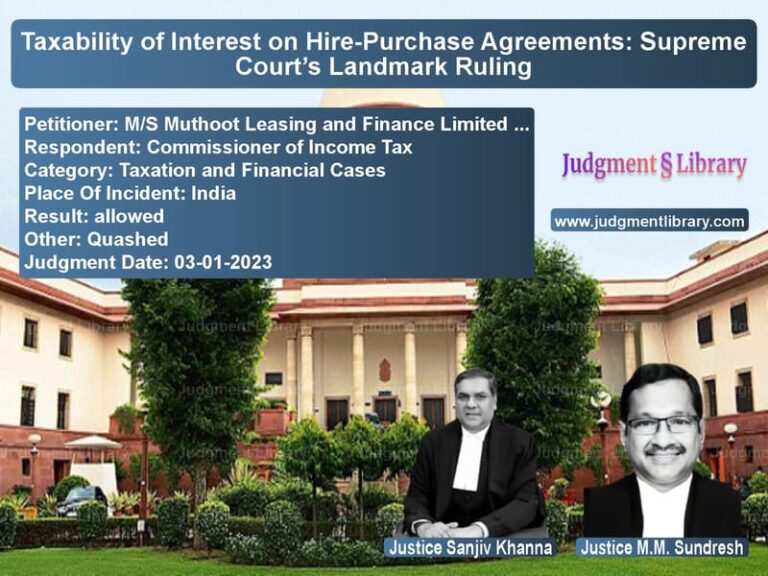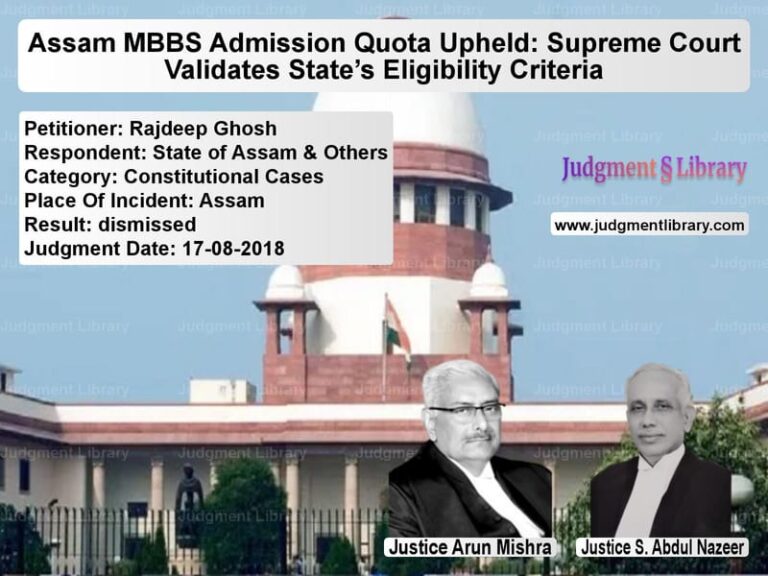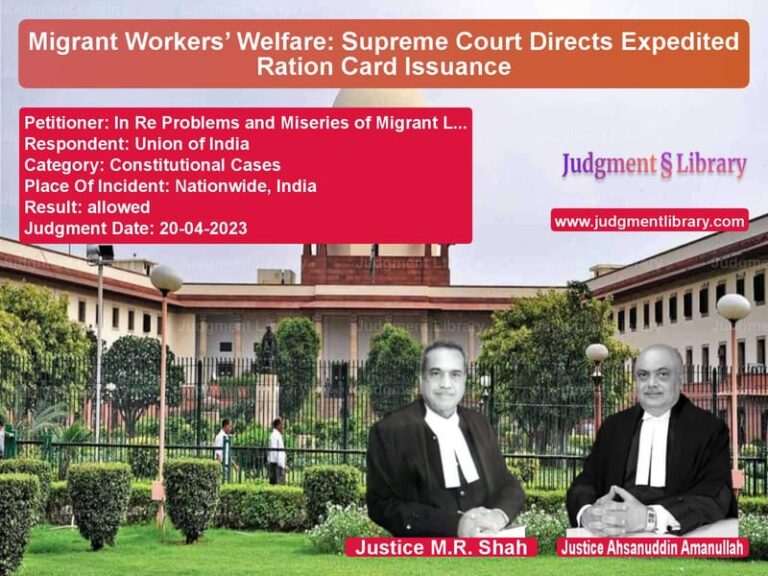Legal Battle for Same-Sex Marriage Rights in India: Supreme Court’s Landmark Judgment
The Supreme Court of India recently ruled in the case of Supriyo @ Supriya Chakraborty & Anr. vs. Union of India, addressing the long-debated issue of same-sex marriage. The case revolved around the constitutional rights of LGBTQ individuals and their demand for legal recognition of their marriages. The petitioners sought the interpretation of the Special Marriage Act, 1954 (SMA) to be gender-neutral, allowing same-sex couples to marry under Indian law.
The Court’s verdict has sparked widespread discussion, marking a significant moment in India’s legal history regarding LGBTQ rights. While the ruling did not grant same-sex couples the right to marry, it acknowledged their hardships and directed the government to consider legal measures to protect their civil rights.
Background of the Case
The petitioners, a group of same-sex couples, argued that their exclusion from marriage laws violated their fundamental rights under Articles 14, 15, 19, and 21 of the Indian Constitution. They contended that marriage is not merely a social contract but a fundamental right, and the state’s failure to recognize their unions deprived them of legal protections available to heterosexual married couples.
Read also: https://judgmentlibrary.com/supreme-court-upholds-senior-advocate-designation-under-advocates-act/
The case drew attention to various legal precedents, including the Navtej Singh Johar vs. Union of India (2018) judgment that decriminalized same-sex relationships and the NALSA judgment (2014) that recognized transgender rights. Petitioners relied on these rulings to argue that legal recognition of same-sex marriage was a logical progression in ensuring full equality for LGBTQ individuals.
Petitioners’ Arguments
- The right to marry is a fundamental right under Articles 14 (Equality), 15 (Non-discrimination), 19 (Freedom of Expression), and 21 (Right to Life and Personal Liberty).
- Excluding same-sex couples from the SMA amounts to discrimination and violates the principle of equality.
- The term “marriage” should be interpreted in a gender-neutral manner to ensure inclusivity.
- Same-sex couples are denied rights related to adoption, inheritance, medical decision-making, and spousal benefits.
- Countries worldwide have recognized same-sex marriage, and India must follow suit to protect the dignity of LGBTQ citizens.
Respondent’s Arguments (Union of India)
- Marriage, as historically and traditionally understood in India, has been between a biological male and a biological female.
- The right to marry is not an absolute fundamental right, and legislative intervention is required to change marriage laws.
- Allowing same-sex marriage would require changes to personal laws governing Hindus, Muslims, Christians, and other religious communities.
- The state has a legitimate interest in defining marriage as a union between a man and a woman for social stability and family structures.
- The issue should be debated in Parliament rather than being decided by the judiciary.
Supreme Court’s Key Observations
The five-judge Constitution Bench, led by Chief Justice D.Y. Chandrachud, made several important observations:
1. Right to Marriage Not Absolute: The Court ruled that while marriage is an important aspect of life, it is not an absolute fundamental right under the Constitution. The Court acknowledged the hardships faced by LGBTQ individuals but held that legal recognition of marriage falls under the legislative domain.
2. Special Marriage Act (SMA) Cannot Be Read as Gender-Neutral: The Court refused to interpret the SMA in a gender-neutral manner, stating that such an interpretation would amount to judicial legislation. The Court noted that marriage laws were framed with a specific intent and structure, requiring legislative amendment for any change.
3. Protection of LGBTQ Rights: The Bench recognized the discrimination faced by LGBTQ individuals and urged the government to establish a legal framework ensuring their rights related to inheritance, succession, and adoption. The Court suggested that a government committee be formed to explore legal protections for same-sex couples.
4. State’s Role in Defining Marriage: The Court emphasized that marriage as an institution has evolved through legislative action. Any alteration to its definition must be done by the Parliament and not through judicial intervention.
Final Verdict
The Supreme Court, in its final judgment:
- Dismissed the petition seeking recognition of same-sex marriage under the Special Marriage Act.
- Directed the government to set up a committee to explore legal protections for LGBTQ couples.
- Reaffirmed that LGBTQ individuals have the right to personal relationships, dignity, and non-discrimination.
- Refused to grant adoption rights to same-sex couples, leaving it to legislative discretion.
Implications of the Judgment
This judgment has significant implications for LGBTQ rights in India:
- No Immediate Legal Recognition: Same-sex marriage remains unrecognized, requiring legislative action for any future changes.
- Call for Legislative Intervention: The ruling places the responsibility on Parliament to consider legal protections for same-sex couples.
- Push for LGBTQ Civil Rights: The government is expected to formulate policies addressing rights related to cohabitation, property inheritance, and medical decision-making for LGBTQ couples.
- Potential Future Challenges: LGBTQ activists may continue to press for legislative changes and challenge discriminatory laws in the future.
Conclusion
The Supreme Court’s ruling in Supriyo @ Supriya Chakraborty & Anr. vs. Union of India marks a turning point in India’s legal discourse on LGBTQ rights. While it did not legalize same-sex marriage, it acknowledged the discrimination faced by LGBTQ individuals and urged the government to address their legal and civil rights.
The judgment has sparked renewed discussions on marriage equality, with activists calling for legislative reforms. The case serves as a reminder that while legal battles can bring attention to social issues, lasting change often requires political and legislative will. As India moves forward, the recognition of same-sex relationships remains a key issue in the ongoing struggle for equality and dignity.
Petitioner Name: Supriyo @ Supriya Chakraborty & Anr..Respondent Name: Union of India.Judgment By: Justice Dhananjaya Y Chandrachud, Justice Sanjiv Khanna, Justice Hima Kohli, Justice B.V. Nagarathna, Justice S. Ravindra Bhat.Place Of Incident: India.Judgment Date: 17-10-2023.
Don’t miss out on the full details! Download the complete judgment in PDF format below and gain valuable insights instantly!
Download Judgment: supriyo-@-supriya-ch-vs-union-of-india-supreme-court-of-india-judgment-dated-17-10-2023.pdf
Directly Download Judgment: Directly download this Judgment
See all petitions in Fundamental Rights
See all petitions in Constitution Interpretation
See all petitions in Public Interest Litigation
See all petitions in Judgment by Dhananjaya Y Chandrachud
See all petitions in Judgment by Sanjiv Khanna
See all petitions in Judgment by Hima Kohli
See all petitions in Judgment by B.V. Nagarathna
See all petitions in Judgment by S Ravindra Bhat
See all petitions in dismissed
See all petitions in supreme court of India judgments October 2023
See all petitions in 2023 judgments
See all posts in Constitutional Cases Category
See all allowed petitions in Constitutional Cases Category
See all Dismissed petitions in Constitutional Cases Category
See all partially allowed petitions in Constitutional Cases Category

